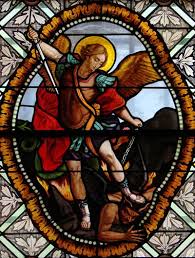
We have recently marked Michaelmas, the festival (or “feast” in church jargon) of St Michael and all the other angels. I think it still has significance in some calendars; when I was at university, the term between September and December was “Michaelmas”. Traditionally, St Michael is thought of as the leader of the Heavenly army; a warrior with a flaming sword.
Today, I suspect some people are far happier believing in Angels than in God, or at least anything recognisable as orthodox Christianity. Films, songs and TV programmes celebrate guardian angels; someone supernatural who looks out for us but without the need for us to get involved in the messy, costly business of a death on a cross. In the Bible, angels first appear as messengers of God; the Hebrew for angel is the same as the word for messenger. God was considered so holy that nobody could look on him and live; angels provided a way for people to have a vision from God without the inconvenience of immediate death. They seem to have become more popular as Judaism interacted with neighbouring cultures and Christianity took this on, so we have the Angel host who performed before the shepherds to announce the birth of Jesus.
For those of us of a liberal disposition in our faith, talk of angels can be sometimes a bit embarrassing; I was never sure what to make of a lady who said she saw an angel at Tuck Hill Church in her youth. But alongside the lady recalling an event from 70 years previously are the poets and mystics who speak of seeing angels. I suspect that they are reminding the rationalists amongst us that there really is a spiritual realm that underlies the physical universe and it bursts out to reveal itself to us. I’m not too bothered about what actually happens when people talk of seeing an angel; all I know is that God is spirit and people encounter him in many ways, sometimes unaware.